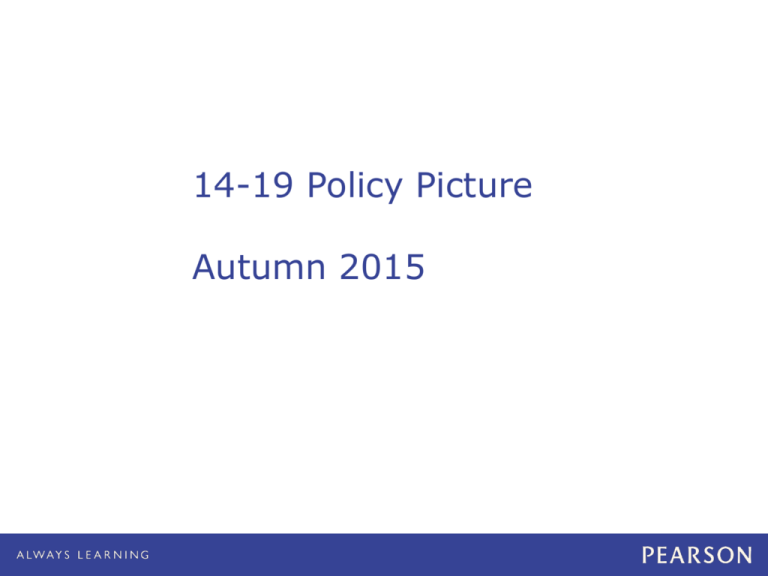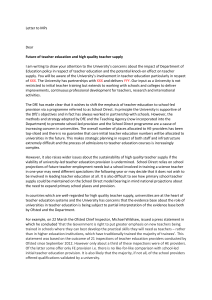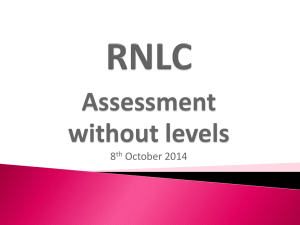14_19_policy_picture_autumn_15
advertisement

14-19 Policy Picture Autumn 2015 The big policy picture 6 months on • Slim majority but government keen to display energy/exploit Opp discomfort – 14 Cabinet Committees, 11 Implementation Taskforces – 26 Bills – Budget, Productivity and Skills Plans, HE Green Paper and EBacc consultation out, SR, Autumn Stat, Growth Plan to come • Mantra is ‘One Nation’ but pitch is to middle Britain – Aim is to hog centre/common ground for foreseeable future – Use of local determinism, autonomy and digitalisation to transform provision of core services and create smaller but ‘smarter’ state – Education and skills an important part of the pitch as avenues of opportunity and drivers of economy • The economic plan providing the head – – – – • 2 phases with moveable landmark of 2018/19 Set around the Party’s 6-stage life plan All policy geared to ensure this succeeds, Osborne the planner-in-chief Performance of education and skills system a necessary component in the plan and won’t be left alone until it (the plan both economic and life) succeeds Social justice providing the heart – Kinder, compassionate, caring but also aspiration, opportunity, mobility – Education with pivotal role, positive impact on many social mobility indicators • BUT, 2nd terms often derailed by the unexpected Schools. Current position • • Largely a continuity agenda, PM making big announcements, Ed Secretary adding own tone, stability needed while curriculum reforms bed in Big push on performance, solid in this year’s exams but government deploying 3 mechanisms to raise standards – Sharper accountability through testing, progress reporting, coasting – Further transformation of school system through academies, free schools – Focus on core teaching through Eng/maths and EBacc requirements • • • • • • Key date likely to be 2017 when qual reforms in place, primary measures applied, Progress 8 fully in place, coasting data clearer Current qual reform schedule applies though debates continuing about the nature of the curriculum, new GCSE grading scale, case for AS levels and public perceptions generally. Focus shifting towards assessment Concerns about pressures on pupils rising up the agenda, issues ranging from health and learner welfare to safeguarding and social mobility Concerns also about pressures on teaching profession with 3 new workload groups, 2 taskforces, a National Teaching Service, recruitment and retention issues, NAO inquiry into ITT Attainment gap issues remain and raised in PM’s Conference speech. Likely to be raised in OECD, Ofsted, Social Mobility reports this autumn Labour likely to pitch Opposition tents around local accountability, teacher recruitment, early years provision and 16-19 funding Current challenges 1.Implementing an extensive qualification reform programme 2.Understanding new forms of accountability 3.Supporting the workforce 4.Dealing with continuous structural reforms 5.Managing financial pressures 6.Seeing over the parapet 1. Qualification reform • Current policy – Close gaps, match best international standards • Current position – – – – – • KS2: 80% reach L4 in reading, writing, maths (Summer 2015) KS4: 56.1% achieve GCSE A*-C grade inc Eng/ma (Summer 2015) KS5: 98.1% overall pass rate at A’ level (Summer 2015) Attainment gap: closed by 4.7% in primary, 1.6% in secondary Destination data: 93%@KS4, 73% @KS5 in continuous learning or employment Manifesto pledges – Introduce ‘tough’ new standards for literacy and numeracy in primary – Ensure all secondary pupils required to take GCSEs in ‘core’ subjects and Ofsted unable to award highest grade to schools that refuse to teach them – Increase the number of teachers able to teach Mandarin – Deliver 3m apprenticeships over the next five years – Guarantee every ‘child’ a place on the National Citizen Service • Developments since May – – – – – – Ofqual Perceptions survey suggests some confusion over qual changes (June) McDonalds, CBI, Pearson publish series of reports on need for skills-base curr (July) 2015 exam results published, poll finds opposition to EBacc requirement (August) Ofsted and OECD publish critical reports on KS3 and computing (Sept) DfE publish interim exam results, Ofqual appear before Select Committee (Oct) DfE launch consultation on implementation of EBacc (Nov) 1. Qualification reform • Current mechanisms – – – – – – – – • Adoption of EBacc core curriculum Phased introduction of more demanding GCSEs and A’ levels Application of more formal testing and assessment Pursuit of English and maths up to age 18 Introduction of post-16 Core maths qualifications Further reform of Functional skills Implementation of traineeships and apprenticeships New ‘expert’ panel to help shape specialist high-tech 16-19 route Current issues – – – – – – – – – – Impact of EBacc adoption on curriculum balance and skills provision Continued appetite for wider 14-19 reform Inspectorate concerns about focus ‘wasted years’ at KS3 Unease about some aspects of the reforms Concerns about some aspects of the exam system (marking, appeals) The role and remit of the NRT The suitability or otherwise of apprenticeships in schools The case for a return to universal work experience Supply or lack of specialist teachers Impact of performance pressures on teachers and pupils 2. Accountabilities • Current policy – Use of data to help develop sharper and more targeted monitoring and accountability arrangements • Current position – ‘Primary schools improving (84% judged good or outstanding) but secondaries stalling (77% judged good or outstanding)’ Ofsted Annual Report Dec 2014 – National Attainment 8 score from Progress 8 pioneers – 235 schools deemed failing under current coasting criteria • Manifesto pledges – Pupils who fail to reach required level at the end of KS2 to resit at start of sec – Any school judged by Ofsted to be requiring improvement to be taken over by ‘best’ head teachers • Developments since May – Government announces new coasting procedure as part of Education Bill, Ofsted announces new CIF (June) – DfE publishes Stat of Intent for performance tables for 2015 and beyond (July) – DfE updates guidance for Progress 8 2016 and 2017 (August) – DfE announces review of smartphones in class as part of Behaviour review (Sept) – DfE launches consultation on latest coasting and intervention criteria (Oct) – Range of performance measures to ‘support’ EBacc adoption (Nov) 2. Accountabilities • Current mechanisms – – – – – – – – – • Review of assessment arrangements and reporting for 7 year olds Introduction of KS2 resits Implementation of Progress 8 at KS4 Implementation of new performance measures at KS5 Introduction of new Ofsted inspection arrangements Introduction of new coasting benchmark New guidance on intervening in schools causing concern Continued development of performance tables Use of institutional performance management Current issues – – – – – – Technicalities of running KS2 resits Impact of Progress 8 on provision and performance Impact of new Ofsted arrangements Managing the demands of data Development of robust destination measures Coping with the impact of social media 3. Teachers • Current policy – Profess love and support, use of workload strategy to release pressures • Current position – 450,000 + teachers to 7.7m pupils – 35,000 trainee teachers needed each year – Significant shortages in recruitment of some teacher training courses notably MFL, D/T, RE, Physics, Business Studies, Art – Potentially up to 2,000 new head teachers needed annually • Manifesto pledges – – – – – • An additional 17,500 maths and physics teachers to be trained over next 5 years All teachers to be trained in how to deal with ‘low level disruption’ Support for the creation of an independent College of Teaching Commitment to use of bursaries for most in-demand subjects Commitment to reduce time spend on paperwork Developments since May – Teach First warn of deepening recruitment crisis, DfE announces new ‘Behaviour Review’ group (June) – Prof Dec Expert Group call for evidence to help develop new CPD standard (Sept) – DfE publish latest scenario modelling highlighting need for increase in supply in many subject areas, also announce 2016/17 bursaries for new teachers in core subjects; NUT survey, Pearson/LKMco reports published (Oct) – Secretary of State announces new ‘commando’ force (Nov) 3. Teachers • Current mechanisms – – – – – – – – – – • Development of clearer professional standards Implementation of new pay and performance regime Use of Workload Challenge groups to siphon off heat Commissioning of series of teacher-based ‘review’ groups Development of College of Teaching Announcement of further bursaries Launch of new advertising recruitment campaign Education Committee inquiry into recruitment NAO review of ITT 2016 launch of new National Teaching Service Current issues – Deepening concerns about future recruitment and retention levels and shortages of teachers in key subject areas – Government pushing for more mobile and flexible profession – Continuing unease about teacher training and skill needs – Impact of continuing squeeze on pay and pensions – Reported rise in teacher disenchantment 4. Structural reforms • Current policy – Shift towards more flexible and autonomous school system • Current position – 4760 Academies, 305 Free Schools, 40 Studio Schools, 39 UTCs, 7 Career Colleges – Local management through RSC system – Range of models for provision of other services • Manifesto pledges – Open at least 500 new Free Schools – Continue to expand Academy, Studio School and UTC programme – Use JCP advisers to supplement careers advice • Developments since May – DfE announces sponsored Academy arrangements will come under RSCs, PM speech on turning round ‘1,000 failing schools’ (June) – Prevent duty comes into force, DfE report indicates 20% rise in secondary pupil numbers, Sutton Trust report on Academy Chains (July) – PM’s ‘100 day’ speech calls for every school to be an Academy, Lord Baker calls for 25 Career Colleges by 2020, mental health champion announced (August) – PM pledges 2 waves of Free Schools every year to 2020, Careers Co launches Enterprise Advisers network (Sept) – SoS calls for schools open for childcare, confirms new grammar school site (Oct) – Education Committee Inquiries into RSC system (Oct, Nov) 4. Structural reforms • Current mechanisms – – – – – – – • Government commitment to intensify programme of school diversification Development of the RSC system Attempts to provide a more ‘fluid’ 14-19 provider system Big drive to support STEM programmes Roll-out of Enterprise Adviser (careers) scheme Potential changes to entry rules for summer born babies Area-based reviews of post-16 provision Current issues – – – – – – – Continuing tensions about nature, costs, local impact of Academies/Free Schools Continuing concerns about school sizes and availability of resources Potential review of remit of RSCs and how best to manage school improvement How best to support continuing ‘cold’ spots such as coastal towns Children’s safety, safeguarding and mental health concerns Concerns about provision of other services eg careers, work experience Choice v competition and role of local partnerships 5. Funding and finance • Current policy – Protect per pupil funding 5-16 but within efficiency framework • Current position – DfE budget currently at £57.6bn though budget cut earlier this year – MFG continuing at 1.5% (subject to SR) – Fair funding uplift carrying forward for another year • Manifesto pledges – – – – – • Protect per-pupil funding for 5-16 yr olds Protect for pupil premium but at current rate Provide free school meals for all infants Invest at least £7bn over next 5 years in ‘good’ school places Remove NICs for young apprentices under 25 Developments since May – Chancellor announces new debt reduction measures inc £450m for DfE (June) – DfE publishes 2016/17 LA per-pupil funding rates, Chancellor launches 2015 Spending Review (July) – SFCA Funding Impact Survey (August) – Closing date for submissions on SR plans to Treasury (Sept) – IFS briefing on potential impact of SR on school funding, F40 petition on school funding formula (Oct) 5. Funding and finance • Current mechanisms – SR 2015 completing, 2 scenarios modelled by Depts – 2 phases: 2016-2018/19 = reduce gov spending by 1% each year, 2018-2019 = move into surplus, no longer cutting, aim to grow in line with inflation – Net effect (1:) £30bn of ‘fiscal consolidation’ (inc: £13bn from dept savings) for next 2/3 years, continued austerity for most of next 5 years – Net effect (2:) Total gov spending by 2020 forecast to be ‘slightly higher than in 2000’ – Net effect (3:) Range of bleak forecasts for school/college budgets depending on what’s protected – Treasury looking for increased efficiency and productivity from the school system – Continuing commitment to creation of fairer funding model • Current issues – “The overall funding settlement for schools will feel quite different over the next 5 years compared to the previous 5” IfS – Impact on non-protected areas – Pupil premium subject to series of reports – Concerns about ability to offer full range of choices especially at 16-19 – Rise in pension and NI contributions adding to the pressures – LAs continuing to face tight settlements – Impact of the rise in pupil numbers and different regional pictures Schools. What to look out for • • • • • • • • Education Bill moving to final stages, DfE consultation on coasting criteria and intervention powers closes 18 December, due to take effect from summer 2016 Qual reform. Phased implementation programme under way, development work, consultations continuing, Sainsbury panel report due spring 2016 Assessment. Growing concerns about assessment demands and capabilities including impact of new curriculum on marking and appeals. Primary sector grappling with baseline testing and Assessment without Levels, Rochford Review due December, Ofqual report on appeals shortly Inspections. New regime now operating, some significant specialist reports now out on KS3 and Apprenticeships, 16-19 PoS to come, Annual Report due December Performance. Prov data for 2015 published, final performance tables due Jan 2016, OECD report Nov, UCAS report Dec 2015, PISA results Dec 16 School system. Latest wave of Free Schools proposals announced, PM pushing Academy model, reforms putting pressures on local accountability and role of RSCs, careers still a concern Teachers. Workload groups due to report spring 2016, STRB working to 1% pay rise, series of reports (NUT, Key, Pearson) reveal prof unease Technology in learning. Still some way off, use of smartphones in class under review, BETT coming but OECD report dividing opinion FE. Current position • • • • Unprotected, strapped for cash, still suffering from ‘middle child’ syndrome but key supplier of some important curriculum components from basic skills, to apprenticeships, to high-tech route Improving picture of performance but Eng/maths, apprenticeships, 16-19 PoS, local responsiveness regularly cited as weaknesses in Ofsted reports Sympathetic Minister though focused on apprenticeship target FE remit laid out in Treasury Productivity Plan – – – – Apprenticeships as backbone of employer driven skills system (levy, status, 3m) Use of Nat Colleges and IoTs to support prestigious L4/5 route Devolution of planning and commissioning provision to local partnerships Streamlining of qualification system, reduction in volume and shifting funding from government grants to loans and employer investment – Improved destination and performance/outcome data to increase choice and responsiveness • • Currently facing major government prompted but locally led structural review. Considerable sector restructuring likely to follow: fewer but bigger colleges, rash of mergers, increase in collaborative (across school-college) models, demise of GFE/SFC and rise of the specialist brand AoC Treasury submission pretty much defining where current pinch points are: 16-19; school sixth form competition; staff recruitment for Eng/maths; constant cuts and lack of financial planning; gov interference FE. What to look out for • • • • • • • • 3 key pieces of legislation moving towards completion Local structures. 7 area-based reviews now announced, 2nd wave due to follow spring 2016, local picture varying across the country but sense of streamlining very strong; further details on IoT model due Funding. Awaiting SR 2015 with growing sense of anxiety despite rear guard action by AoC, Wolf and Policy Exchange; loans, levy and localism all likely to feature Qualifications. QCF out, RQF now in, SFA moratorium on approval of new quals from October, continuing reform of VQs, green light given to development of FS, government likely to keep pressure up on reducing volume, keen for employer endorsement of quals where possible Accountability. 16-19 measures due from 2016, 19+ measures under consultation, new inspection regime under way, Annual Report due Dec Apprenticeships. Legal status now enshrined in legislation, levy model due to be revealed in SR, employer-led standard development through Trailblazer system, continuing concerns about target and take-up @ 16-19 Localism. Sheffield City Agreement latest in 30+ local area growth deals, skills planning and commissioning high up list of functions bid for Annual Colleges Conference and Skills Show set for November along with SR and Autumn Statement, expect significant number of announcements HE. Current position • Policy agenda has been Treasury led and focused on opening up the market (to providers and students) though questions about fees, visas, participation and skill provision remain • About to move on from Willetts/White Paper era through new Green Paper and possible legislation; new strategy being built around: – Excellence in teaching, to be codified in new framework (outcome criteria and metrics) and with funding carrots, likely to be major source of contention – Continued push on widening participation, use of data and access agreements to expose gaps, potential new strategy coming to reassure doubters and highlight government commitment – Opening up the market to new and alternative providers with government keen to shake up system through competition, choice and VFM. Consultation coming with key weapon being new ‘performance pool of places’ – Clear and faster route to degree awarding powers, as above, part of the shake up but will have quality caveats and will be part of consultation – Re-thinking (and re-balancing) the research ‘architecture,’ looking for simpler and less time consuming model which doesn’t leave teaching as a side-line • Postgrads, part-time study, graduate returns, costs and over-supply of the labour market, alternative providers, global positioning, all still issues HE. What to look out for • • • • • • • • UKHE still performing heroically in latest series of global rankings but finding balancing act between investment and output challenging Sector granted key role in Treasury plans for growth and productivity but big debate about where the high-level professional and tech route best sits; danger of pitting HE against FE in dash for cash Green Paper. Setting out basis of new quality defined era but with emphasis on widening participation, opening up provider field and creating new pool of places for best alternative providers Fees. Consultation on freezing the repayment threshold concluded, consultation on allowing fee increases in line with inflation due to follow; some concerns about impact of shift to maintenance loans next year and about support (or lack) for p/t learners and postgrads QA. HEFCE completing review of current arrangements, BIS Committee also holding Inquiry. Combined impact of Green Paper and SR likely to have some impact on future arrangements Visas. Still causing sharp dividing lines, Home Office Committee holding Inquiry into Tier 2 skilled workers system, MAC due to report in December Student numbers. Up 3% for 2015/16 as numbers cap lifted, final figures in UCAS End of Year report due December Future demand. Continuing debate about costs, values, graduate premium sharpened by recruitment approach of DeLoitte, PWC and others



